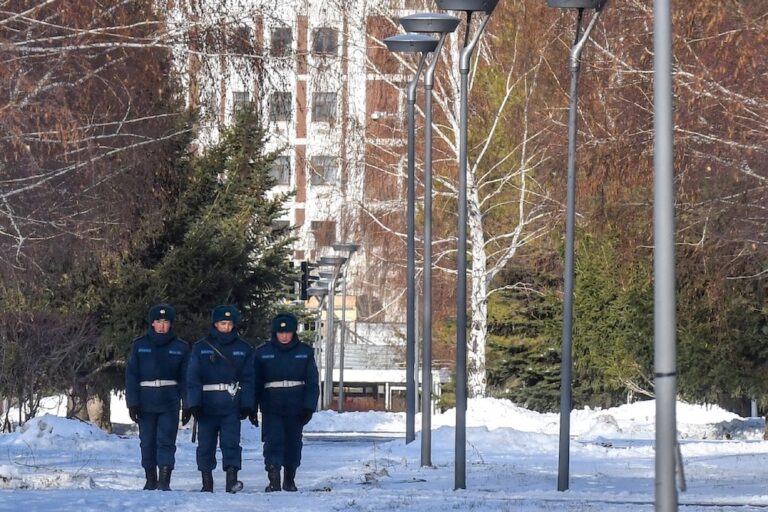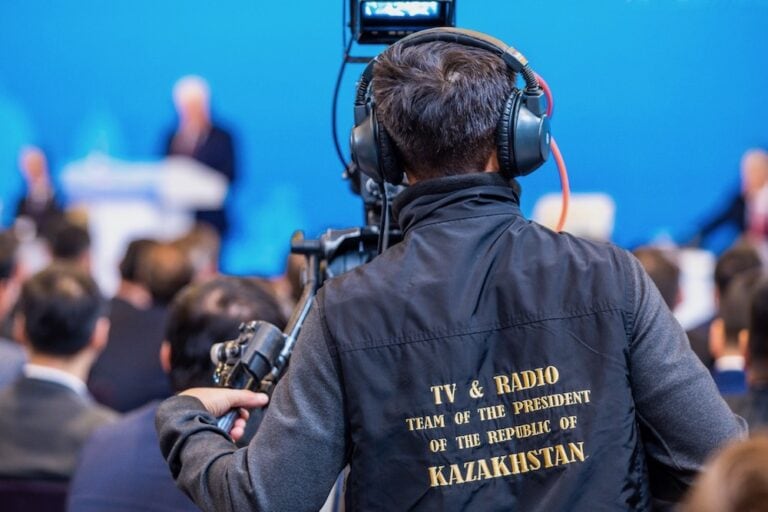(Adil Soz/IFEX) – Media advocacy organizations and media outlets in Kazakhstan are calling on the international community and democratic forces of the country to protest the recently adopted “Yertysbayev amendments” to the country’s media legislation. The following is a joint letter to international organizations, the European Union, the European Parliament, the US Department of State, […]
(Adil Soz/IFEX) – Media advocacy organizations and media outlets in Kazakhstan are calling on the international community and democratic forces of the country to protest the recently adopted “Yertysbayev amendments” to the country’s media legislation.
The following is a joint letter to international organizations, the European Union, the European Parliament, the US Department of State, the US Congress, the Organization for Security and Co-operation in Europe (OSCE), and freedom of expression and human rights groups. Journalists and media advocacy organizations that have signed the letter are listed below.
We are writing on behalf of Kazakh journalists, readers and viewers to call on you to give an assessment of the recently adopted amendments to the country’s media legislation, effective since 21 July 2006. The controversial amendments were proposed by Information Minister Yermukhamet Yertysbayev and were later called “Yertysbayevskiye popravki” (the “Yertysbayev amendments”) by journalists.
These amendments are not the first to worsen working conditions for the media. But the “Yertysbayev amendments” are much more repressive and unconstitutional than all previous ones. They set out punishments up to suspension and closure of media outlets for violations that are not even freedom of expression abuses. This contravenes Article 20 of the Constitution and Article 19 of the International Pact on Civil and Political Rights. The amendments make it mandatory for all media outlets to reregister before replacing their chief editors or moving into another office, which can also be deemed a form of censorship. Another provision, which forbids any media outlet from using the name of a defunct media outlet, is a giant step backwards in the direction of totalitarianism.
Media legislation in Kazakhstan is long overdue for reform, but these reforms should represent a step toward economic prosperity and democracy. The “Yertysbayev amendments” will obviously deprive citizens of their right to freely receive and distribute information, in addition to preventing free media development. These amendments appear to be aimed at bringing the press under total control of the state.
It is highly important to show that this move by the president and government falls short of the obligations of Kazakhstan as an OSCE member state. To protest, European countries can act by boycotting those who “stifle free press”. It will serve as a lesson for local state officials who should be accountable for any actions taken.
We propose that the minister of culture and information, Yermukhan Yertysbayev, be made persona non grata, as he initiated the media amendments despite criticism from the OSCE, the US, the European Union, as well as Kazakh and foreign media advocacy and human rights organizations.
Make the Kazakh information minister persona non grata in your countries!
Seitkazy Matayev,
Chairman of the Union of Kazakh Journalists
Tamara Kaleyeva,
President of Adil Soz Foundation for Protection of Freedom of Speech
Burikhan Nurmukhamedov,
Director of the National Research Institute
Irina Petrushova,
Head of the editorial college of “Respublika” newspaper
Galina Dyrdina,
Deputy chief editor for “Republika” newspaper
Tulegen Askarov,
Economic analyst
Askar Shomshekov,
Center to Support Regional Journalism, Pavlodar
Igor Vinyavskiy,
Chief editor for “Stan.kz” website and member of the Union of Kazakh Journalists
Asylbek Abdulov,
Chief editor of “Epoha” newspaper
Sergazy Mukhtarbekov
Chief editor of “Apta.kz” newspaper
Aidos Sarimov
Deputy chief editor of “Zhas Alash” newspaper


